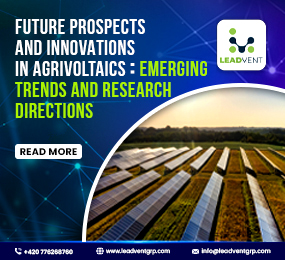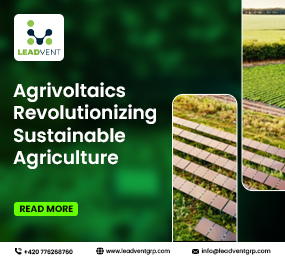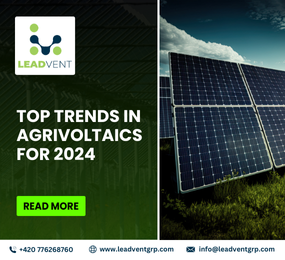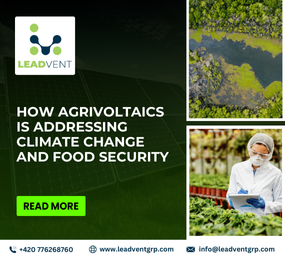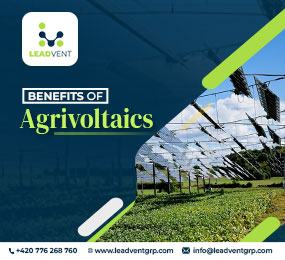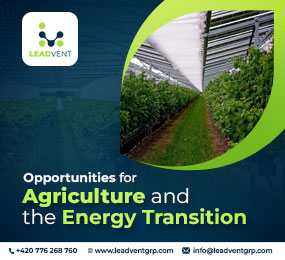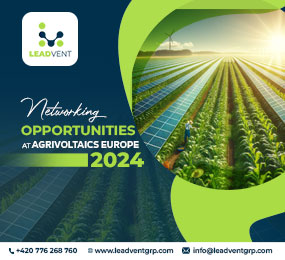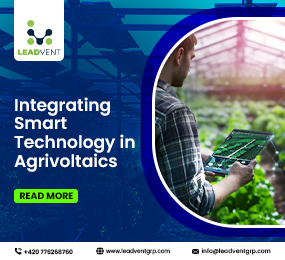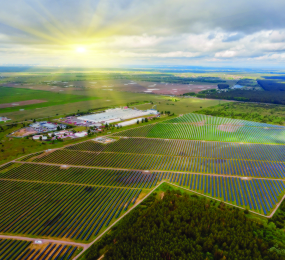Be it the arena of agriculture or renewable energy, Agrivoltaics is always the most burgeoning field and it is the future of our planet. Agrivoltaics in the present scenario is highly adopted globally considering its sustainable features. In such a scenario, the Agrivoltaics conference has colossal significance and it invites the enthusiasts and all the concerned authorities to gather valuable insights and to utilise them properly for reaping the long-term benefits.
AgriVoltaics conference is not just another industry event; it’s a dynamic hub for learning, collaboration, and innovation. Whether you're a seasoned professional, a curious newcomer, or someone passionate about sustainability, the Agrivoltaics Conference offers a treasure trove of educational opportunities designed to inspire and empower. From hands-on workshops to engaging panel discussions with industry leaders, you will gain insights that can transform your approach to agrivoltaics. Here in this blog of Leadvent Group, we will explore the educational opportunities the participants can gain. Let's begin with it.
An Overview of Agrivoltaics Conference
The AgriVoltaics conference is a pivotal event that gathers experts, researchers, policymakers and industry leaders to dive deep into the arena of integration of solar energy along with agricultural practices. 3rd Annual Agrivoltaics Europe, 2024 is set to happen in November and the key discussion topic entails the rural business model, limitations of agrivoltaics, opportunities associated with it and innovations. Besides that, this conference is going to include a range of activities ranging from interactive workshops, strategic meetings, round table discussions and so on.
Top Educational Opportunities That Can Be Derived From Agrivoltaics Conference
The Agrivoltaics conference in a present context is an exciting event and at the same time, it comes with a myriad of educational opportunities. In the course of this blog, we are going to discuss the educational opportunities that can be unlocked by attending this event of huge importance. This event comes up with a wealth of educational opportunities that are designed to consolidate the knowledge of enthusiasts. Here take a look at the opportunities that you can get just by joining the photovoltaic conference.
Comprehensive Learning on Agrivoltaics
Conferences provide an in-depth exploration of agrivoltaic and shed light on essential concepts and practices that participants can implement in their projects. Attending the conferences, the participants such as the research scholars or the agricultural enthusiasts can learn about how agrivoltaic systems allow for simultaneous land use for both solar energy generation and crop production. This dual-use approach maximizes land efficiency, particularly in areas facing land scarcity. In these conferences, the special focus is directed towards the analysis of the case studies. These case studies can reveal how different crops can thrive under solar panels, with insights into which plants are best suited for these environments.
Networking with Industry Experts
Networking is one of the most integral aspects of attending conferences, providing opportunities to build relationships for collaboration and meaningful knowledge sharing. Informal networking sessions allow attendees to engage with industry leaders and fellow participants. These conversations lead to sharing personal experiences, challenges faced in implementing agrivoltaic systems, and potential solutions.
Such exchanges can spark new ideas and partnerships. Participants can interact directly with manufacturers of solar panels, agricultural equipment, and monitoring systems. This hands-on exposure helps attendees better understand the tools available for successful agrivoltaic implementation.
Workshops and Hands-On Sessions
Interactive workshops provide practical learning experiences that deepen understanding of agrivoltaic systems. Participants engage in sessions focused on how solar installations influence local microclimates. Using the modelling software, attendees can visualize how shade from solar panels affects temperature and humidity levels, which in turn impacts crop growth. This knowledge is essential for optimizing plant selection and layout within agrivoltaic systems.
Research Presentations and Innovations
Conferences feature presentations from leading researchers who share groundbreaking findings in agrivoltaics. In addition to that, researchers present their latest studies through e-posters that highlight innovative approaches to agrivoltaics. Topics may include advancements in photovoltaic technology that enhance efficiency or studies on biodiversity benefits associated with dual-use systems. Attendees have the opportunity to engage with researchers directly during Q&A sessions.
Future Trends in Agrivoltaics
Conferences serve as a platform for discussing emerging trends that will shape the future of agrivoltaics. Here the experts have the scope of presenting the cutting-edge technologies that are revolutionizing agrivoltaics, such as bifacial solar panels that capture sunlight from both sides or automated monitoring systems that optimize energy production and crop health. Understanding these innovations equips attendees with knowledge about future possibilities in their projects. Discussions around economic models highlight how agrivoltaics can be financially viable for farmers and investors alike. Presentations may cover market trends in renewable energy credits, carbon trading opportunities, or cooperative models where multiple stakeholders share resources and benefits from agrivoltaic installations.
FAQs
1) What topics will be covered at the Agrivoltaics Conference?
The conference will cover a range of topics, including best practices in agrivoltaic system design, ecological management of grazing systems, legal considerations in project development, and case studies showcasing successful implementations.
2) What networking opportunities are available at the conference?
Attendees can participate in various networking sessions designed to facilitate connections among industry experts, researchers, and practitioners. These interactions can lead to collaborations and partnerships in agrivoltaic projects.
3) How does agrivoltaics impact crop production?
Agrivoltaic systems can create a favourable microclimate for crops by providing shade, which can reduce heat stress and conserve soil moisture. This can lead to improved crop resilience and potentially higher yields.
Closing Thoughts
The Agrivoltaics Conference offers a wealth of educational opportunities that empower participants to advance their knowledge and skills in this innovative field. By engaging with experts, networking with peers, participating in hands-on workshops, exploring cutting-edge research, and discussing future trends, attendees are well-equipped to make meaningful contributions to sustainable agricultural practices while harnessing the power of solar energy effectively.
As this sector continues to grow, staying informed through such conferences will be essential for professionals aiming to lead in sustainable development initiatives. To take part in the upcoming photovoltaic conference, connect with Leadvent Group today.


